Diaries and documents of John Dominic Palandri - Part 30
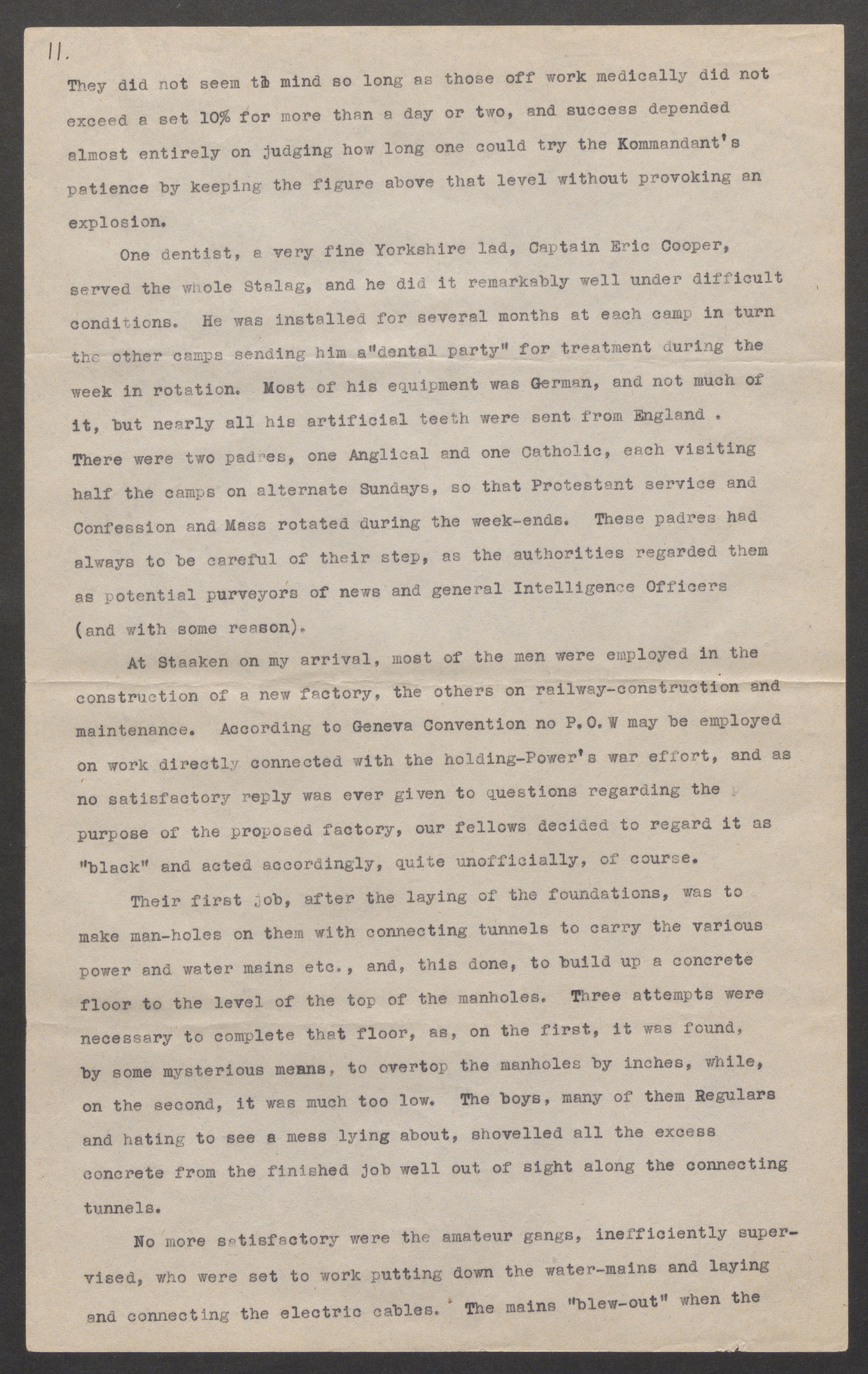
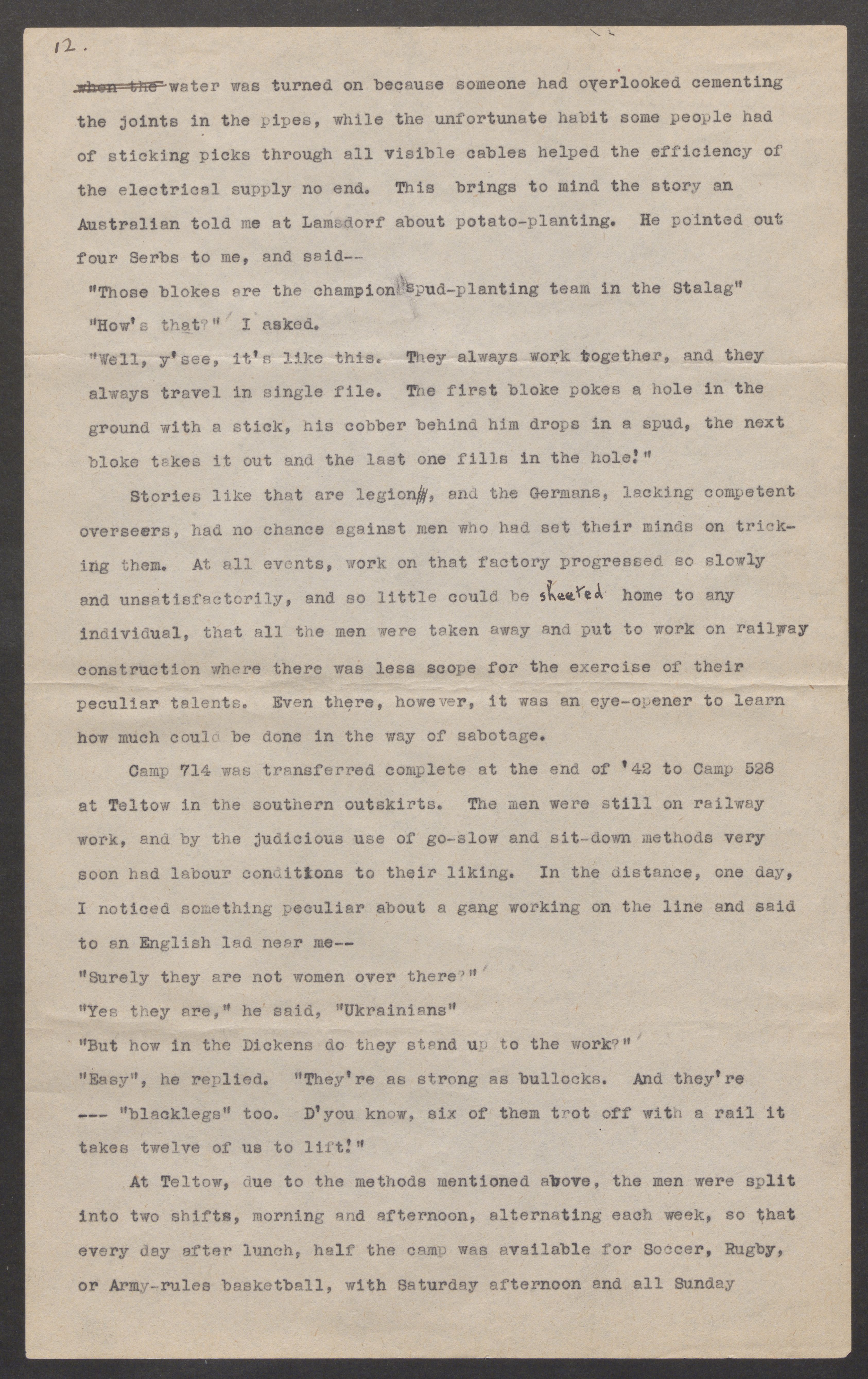
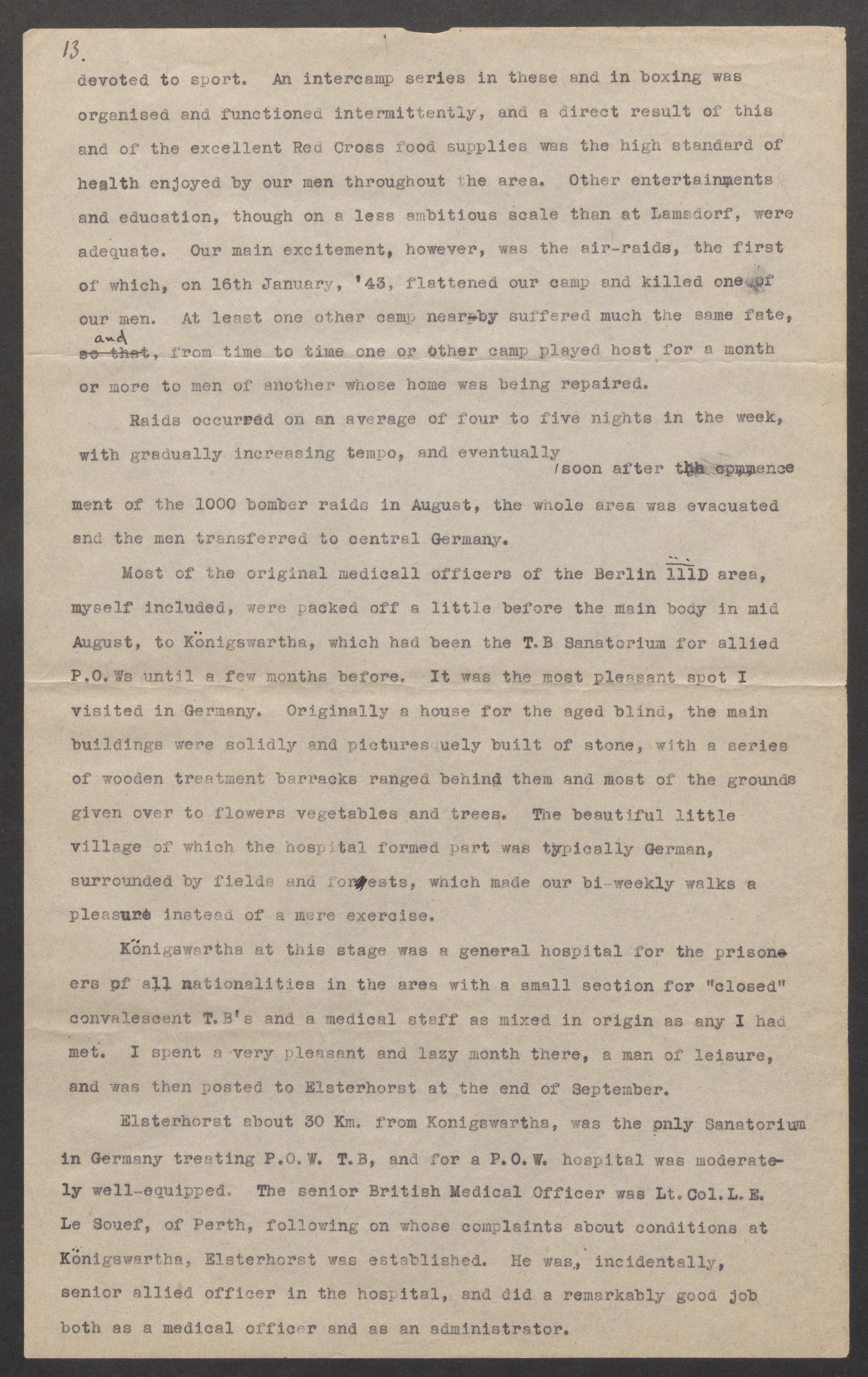
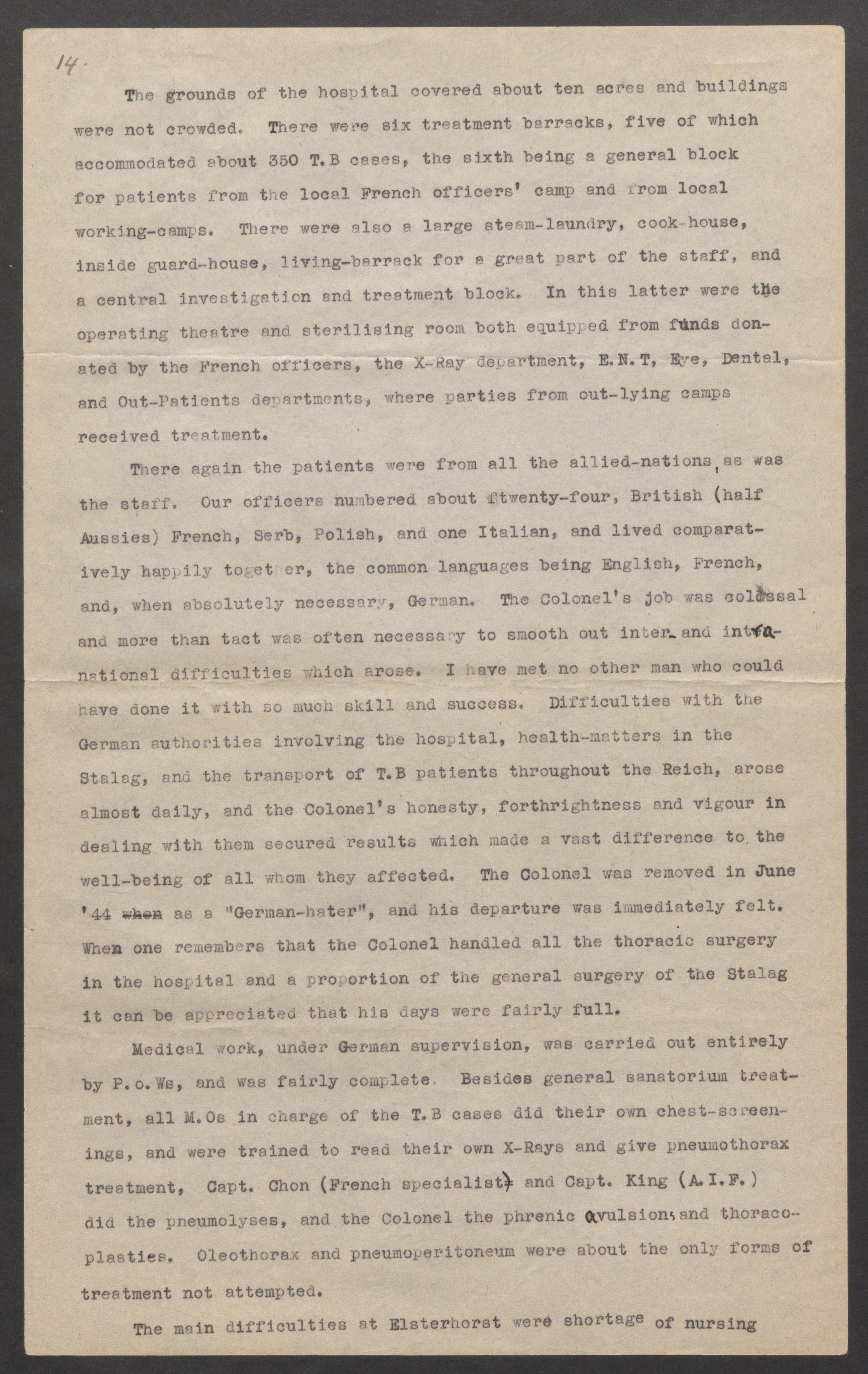
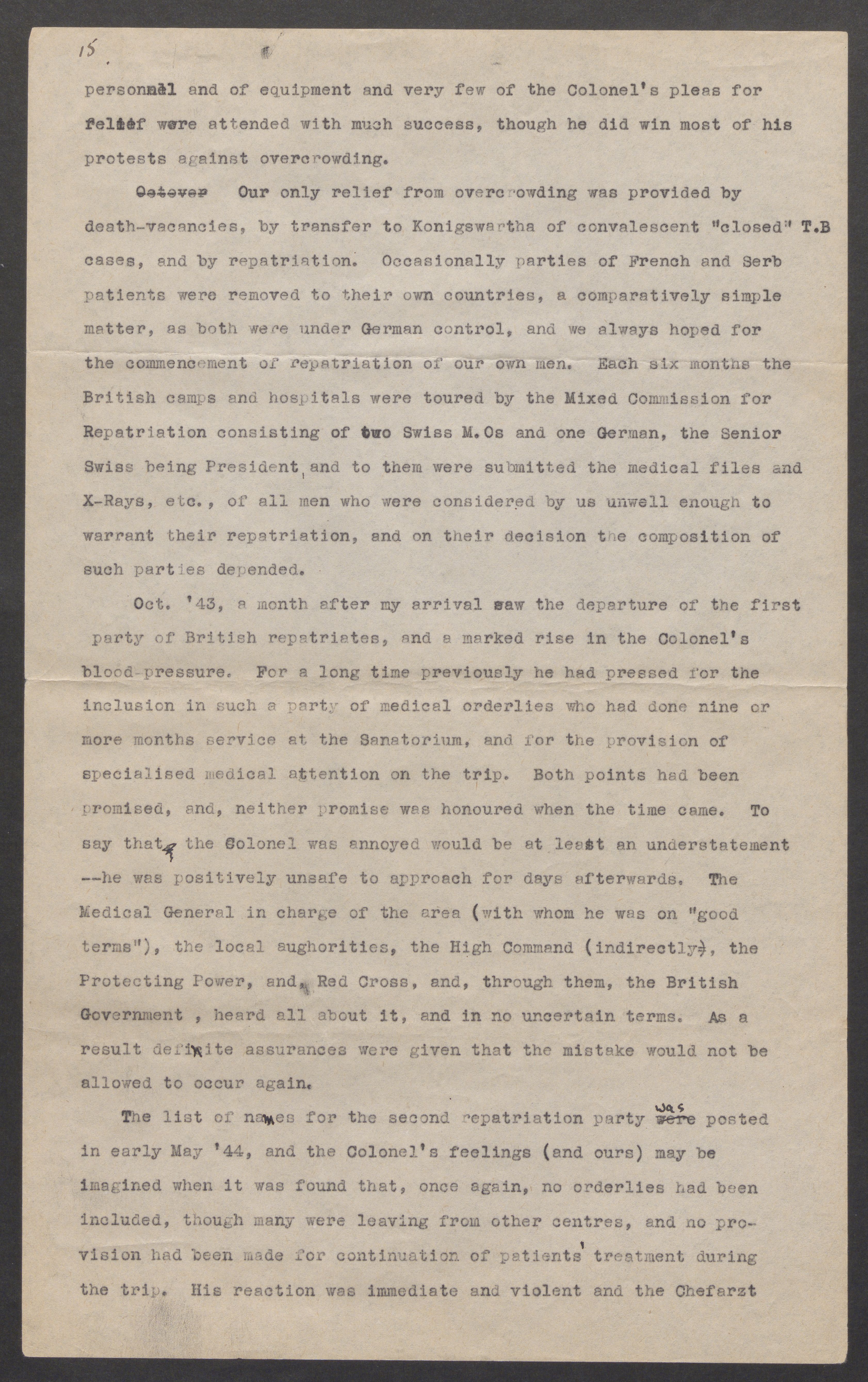
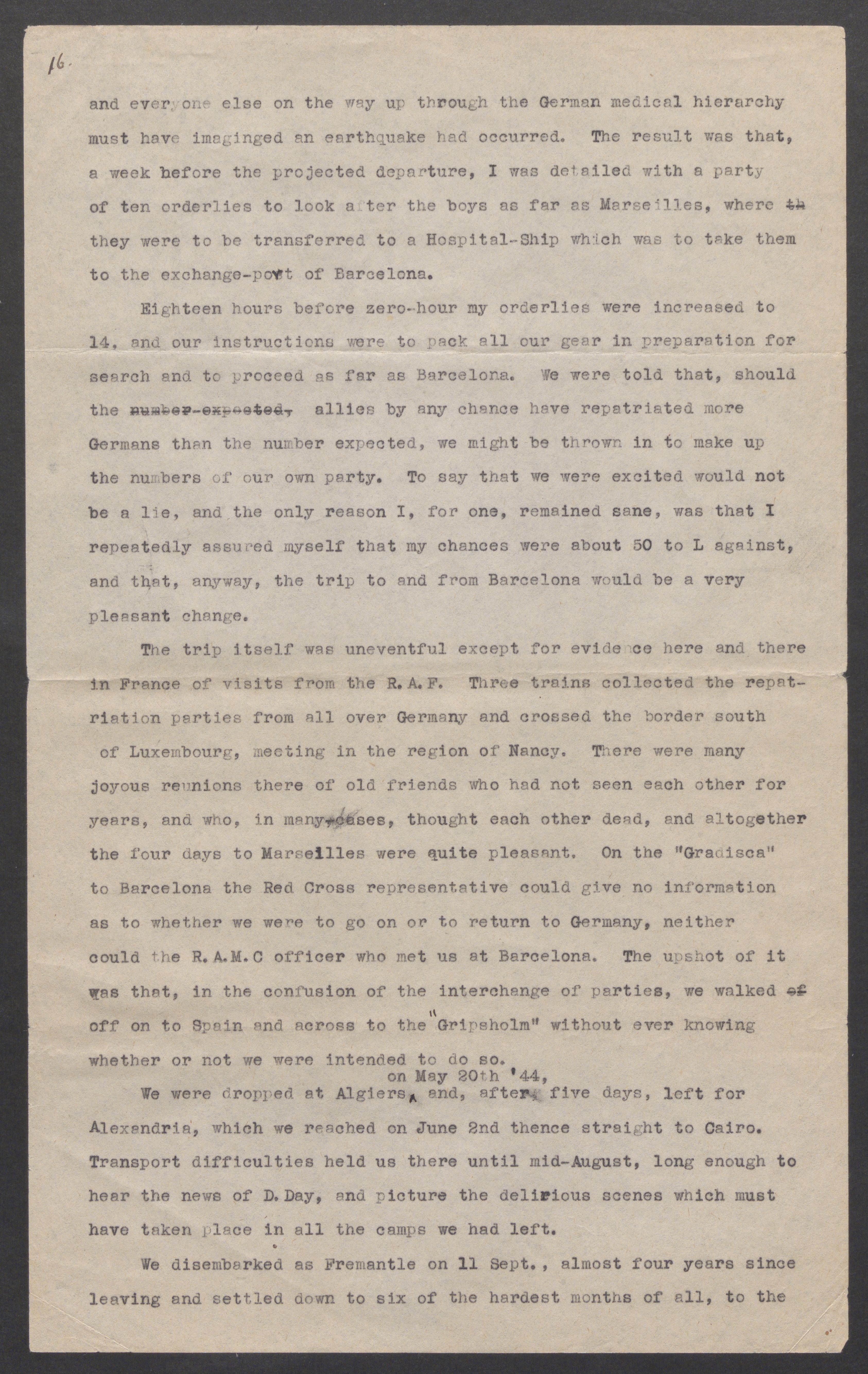
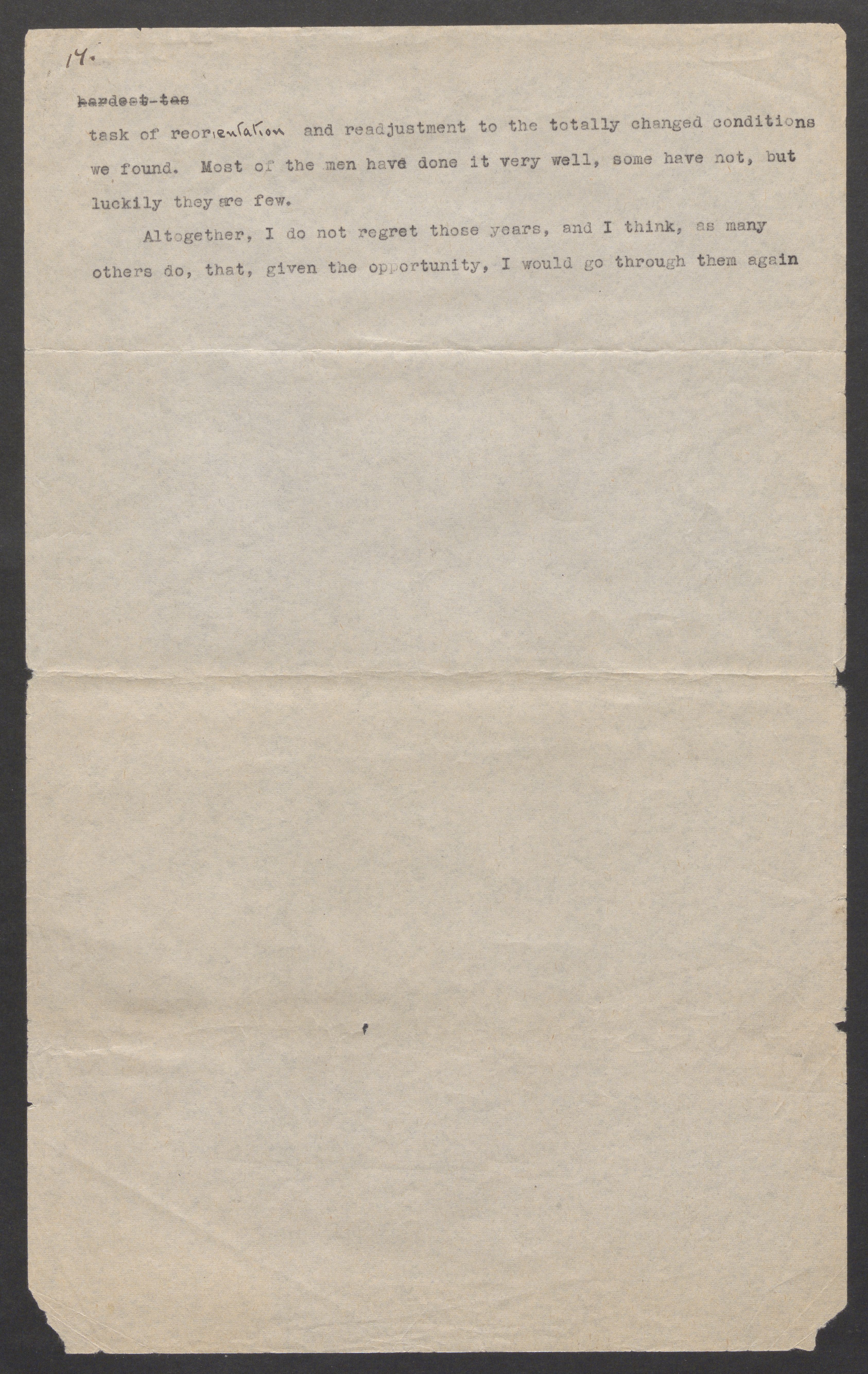
11.
They did not seem to mind so long as those off work medically did not
exceed a set 10% for more than a day or two, and success depended
almost entirely on judging how long one could try the Kommandant's
patience by keeping the figure above that level without provoking an
explosion.
One dentist, a very fine Yorkshire lad, Captain Eric Cooper,
served the whole Stalag, and he did it remarkably well under difficult
conditions. He was installed for several months at each camp in turn
the other camps sending him a "dental party" for treatment during the
week in rotation. Most of his equipment was German, and not much of
it, but nearly all his artificial teeth were sent from England.
There were two padres, one Anglical and one Catholic, each visiting
half the camps on alternate Sundays, so that Protestant service and
Confession and Mass rotated during the week-ends. These padres had
always to be careful of their step, as the authorities regarded them
as potential purveyors of news and general Intelligence Officers
(and with some reason).
At Staaken on my arrival, most of the men were employed in the
construction of a new factory, the others on railway-construction and
maintenance. According to Geneva Convention no P.O.W. may be employed
on work directly connected with the holding-Power's war effort, and as
no satisfactory reply was ever given to questions regarding the
purpose of the proposed factory, our fellows decided to regard it as
"black" and acted accordingly, quite unofficially, of course.
Their first job, after the laying of the foundations, was to
make man-holes on them with connecting tunnels to carry the various
power and water mains etc., and, this done, to build up a concrete
floor to the level of the top of the manholes. Three attempts were
necessary to complete that floor, as, on the first, it was found,
by some mysterious means, to overtop the manholes by inches, while,
on the second, it was much too low. The boys, many of them Regulars
and hating to see a mess lying about, shovelled all the excess
concrete from the finished job well out of sight along the connecting
tunnels.
No more satisfactory were the amateur gangs, inefficiently supervised,
who were set to work putting down the water-mains and laying
and connecting the electric cables. The mains "blew-out" when the
12.when the water was turned on because someone had overlooked cementing
the joints in the pipes, while the unfortunate habit some people had
of sticking picks through all visible cables helped the efficiency of
the electrical supply no end. This brings to mind the story an
Australian told me at Lamsdorf about potato-planting. He pointed out
four Serbs to me, and said--
"Those blokes are the champion spud-planting team in the Stalag"
"How's that?" I asked.
"Well, y'see, it's like this. They always work together, and they
always travel in single file. The first bloke pokes a hole in the
ground with a stick, his cobber behind him drops in a spud, the next
bloke takes it out and the last one fills in the hole!"
Stories like that are legions, and the Germans, lacking competent
overseers, had no chance against men who had set their minds on tricking
them. At all events, work on that factory progressed so slowly
and unsatisfactorily, and so little could be sheeted home to any
individual, that all the men were taken away and put to work on railway
construction where there was less scope for the exercise of their
peculiar talents. Even there, however, it was an eye-opener to learn
how much could be done in the way of sabotage.
Camp 714 was transferred complete at the end of '42 to Camp 528
at Teltow in the southern outskirts. The men were still on railway
work, and by the judicious use of go-slow and sit-down methods very
soon had labour conditions to their liking. In the distance, one day,
I noticed something peculiar about a gang working on the line and said
to an English lad near me--
"Surely they are not women over there?"
"Yes they are," he said, "Ukrainians"
"But how in the Dickens do they stand up to the work?"
"Easy", he replied. "They're as strong as bullocks. And they're
--- "blacklegs" too. D'you know, six of them trot off with a rail it
takes twelve of us to lift!"
At Teltow, due to the methods mentioned above, the men were split
into two shifts, morning and afternoon, alternating each week, so that
every day after lunch, half the camp was available for Soccer, Rugby,
or Army-rules basketball, with Saturday afternoon and all Sunday
13.
devoted to sport. An intercamp series in these and in boxing was
organised and functioned intermittently, and a direct result of this
and of the excellent Red Cross food supplies was the high standard of
health enjoyed by our men throughout the area. Other entertainments
and education, though on a less ambitious scale than at Lamsdorf, were
adequate. Our main excitement, however, was the air-raids, the first
of which, on 16th January, '43, flattened our camp and killed one of
our men. At least one other camp near-by suffered much the same fate,so that and, from time to time one or other camp played host for a month
or more to men of another whose home was being repaired.
Raids occurred on an average of four to five nights in the week,
with gradually increasing tempo, and eventually,
soon after the commencement
of the 1000 bomber raids in August, the whole area was evacuated
and the men transferred to central Germany.
Most of the original medicall officers of the Berlin 111D area,
myself included, were packed off a little before the main body in mid
August, to Kőnigswartha, which had been the T.B Sanatorium for allied
P.O.Ws until a few months before. It was the most pleasant spot I
visited in Germany. Originally a house for the aged blind, the main
buildings were solidly and picturesquely built of stone, with a series
of wooden treatment barracks ranged behind them and most of the grounds
given over to flowers vegetables and trees. The beautiful little
village of which the hospital formed part was typically German,
surrounded by fields and forrests, which made our bi-weekly walks a
pleasure instead of a mere exercise.
Kőnigswartha at this stage was a general hospital for the prisoners
of all nationalities in the area with a small section for "closed"
convalescent T.B's and a medical staff as sized in origin as any I had
met. I spent a very pleasant and lazy month there, a man of leisure,
and was then posted to Elsterhorst at the end of September.
Elsterhorst about 30 Km. from Konigswartha, was the only Sanatorium
in Germany treating P.O.W. T.B., and for a P.O.W. hospital was moderately
well-equipped. The senior British Medical Officer was Lt. Col. L.E.
Le Souef, of Perth, following on whose complaints about conditions at
Kőnigswartha, Elsterhorst was established. He was, incidentally,
senior allied officer in the hospital, and did a remarkably good job
both as a medical officer and as an administrator.
14.
The grounds of the hospital covered about ten acres and buildings
were not crowded. There were six treatment barracks, five of which
accommodated about 350 T.B cases, the sixth being a general block
for patients from the local French officers' camp and from local
working-camps. There were also a large steam-laundry, cook-house,
inside guard-house, living-barrack for a great part of the staff, and
a central investigation and treatment block. In this latter were the
operating theatre and sterilising room both equipped from funds donated
by the French officers, the X-Ray department, E.N.T, Eye, Dental,
and Out-Patients departments, where parties from out-lying camps
received treatment.
There again the patients were from all the allied-nations, as was
the staff. Our officers numbered about ftwenty-four, British (half
Aussies) French, Serb, Polish, and one Italian, and lived comparatively
happily together, the common languages being English, French,
and, when absolutely necessary, German. The Colonel's job was colossal
and more than tact was often necessary to smooth out inter- and intra-national
difficulties which arose. I have met no other man who could
have done it with so much skill and success. Difficulties with the
German authorities involving the hospital, health-matters in the
Stalag, and the transport of T.B patients throughout the Reich, arose
almost daily, and the Colonel's honesty, forthrightness and vigour in
dealing with them secured results which made a vast difference to the
well-being of all whom they affected. The Colonel was removed in June
'44 when as a "German-hater", and his departure was immediately felt.
When one remembers that the Colonel handled all the thoracic surgery
in the hospital and a proportion of the general surgery of the Stalag
it can be appreciated that his days were fairly full.
Medical work, under German supervision, was carried out entirely
by P.o.Ws, and was fairly complete. Besides general sanatorium treatment,
all M.Os in charge of the T.B cases did their own chest-screenings,
and were trained to read their own X-Rays and give pneumothorax
treatment, Capt. Chon (French specialist) and Capt. King (A.I.F.)
did the pneumolyses, and the Colonel the phrenic avulsions and thoracoplasties.
Oleothorax and pneumoperitoneum were about the forms of
treatment not attempted.
The main difficulties at Elsterhorst were shortage of nursing
15.
personnel and of equipment and very few of the Colonel's pleas for
relief were attended with much success, though he did win most of his
protests against overcrowding.Octever Our only relief from overcrowding was provided by
death-vacancies, by transfer to Konigswartha of convalescent "closed" T.B
cases, and by repatriation. Occasionally parties of French and Serb
patients were removed to their own countries, a comparatively simple
matter, as both were under German control, and we always hoped for
the commencement of repatriation of our own men. Each six months the
British camps and hospitals were toured by the Mixed Commission for
Repatriation consisting of two Swiss M.Os and one German, the Senior
Swiss being President, and to them were submitted the medical files and
X-Rays, etc., of all men who were considered by us unwell enough to
warrant their repatriation, and on their decision the composition of
such parties depended.
Oct. '43, a month after my arrival saw the departure of the first
party of British repatriates, and a marked rise in the Colonel's
blood pressure. For a long time previously he had pressed for the
inclusion in such a party of medical orderlies who had done nine or
more months service at the Sanatorium, and for the provision of
specialised medical attention on the trip. Both points had been
promised, and, neither promise was honoured when the time came. To
say that the Colonel was annoyed would be at least an understatement
--he was positively unsafe to approach for days afterwards. The
Medical General in charge of the area (with whom he was on "good
terms"), the local authorities, the High Command (indirectly), the
Protecting Power, and, Red Cross, and, through them, the British
Government, heard all about it, and in no uncertain terms. As a
result definite assurances were given that the mistake would not be
allowed to occur again.
The list of names for the second repatriation party were was posted
in early May '44, and the Colonel's feelings (and ours) may be
imagined when it was found that, once again, no orderlies had been
included, though many were leaving from other centres, and no provision
had been made for continuation of patients' treatment during
the trip. His reaction was immediate and violent and the Chefarzt
16.
and everyone else on the way up through the German medical hierarchy
must have imagined an earthquake had occurred. The result was that,
a week before the projected departure, I was detailed with a party
of ten orderlies to look after the boys as far as Marseilles, where th
they were to be transferred to a Hospital-ship which was to take them
to the exchange-port of Barcelona.
Eighteen hours before zero-hour my orderlies were increased to
14, and our instructions were to pack all our gear in preparation for
search and to proceed as far as Barcelona. We were told that, should
the number expected, allies by any chance have repatriated more
Germans than the number expected, we might be thrown in to make up
the numbers of our own party. To say that we were excited would not
be a lie, and the only reason I, for one, remained sane, was that I
repeatedly assured myself that my chances were about 50 to L against,
and that, anyway, the trip to and from Barcelona would be a very
pleasant change.
The trip itself was uneventful except for evidence here and there
in France of visits from the R.A.F. Three trains collected the repatriation
parties from all over Germany and crossed the border south
of Luxembourg, meeting in the region of Nancy. There were many
joyous reunions there of old friends who had not seen each other for
years, and who, in many-cases, thought each other dead, and altogether
the four days to Marseilles were quite pleasant. On the "Gradisca"
to Barcelona the Red Cross representative could give no information
as to whether we were to go on or to return to Germany, neither
could the R.A..M.C officer who met us at Barcelona. The upshot of it
was that, in the confusion of the interchange of parties, we walked of
off on to Spain and across to the "Gripsholm" without ever knowing
whether or not we were intended to do so.
We were dropped at Algiers ^on May 20th '44, and, after five days, left for
Alexandria, which we reached on June 2nd thence straight to Cairo.
Transport difficulties held us there until mid-August, long enough to
hear the news of D. Day, and picture the delirious scenes which must
have taken place in all the camps we had left.
We disembarked as Fremantle on 11 Sept., almost four years since
leaving and settled down to six of the hardest months of all, to the
14.hardest tas
task of reorientation and readjustment to the totally changed conditions
we found. Most of the men have done it very well, some have not, but
luckily they are few.
Altogether, I do not regret those years, and I think, as many
others do, that, given the opportunity, I would go through them again
 Sam scott
Sam scottThis transcription item is now locked to you for editing. To release the lock either Save your changes or Cancel.
This lock will be automatically released after 60 minutes of inactivity.